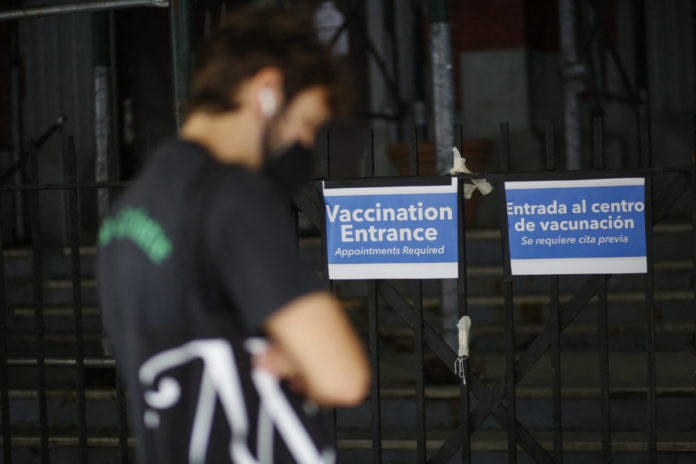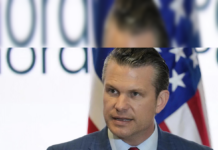
Monkeypox is spreading across the country.
More than 4,600 cases reported as of July 27th in the U.S. That’s a 50% increase in two days.
COVID was supposed to be a wake up call for American public health.
So how did this happen?
“We made a lot of the same mistakes that we’ve made with COVID with this,” Scott Gottlieb, former commissioner of the US Food and Drug Administration, said on CBS’ Face the Nation.
Today, On Point: Why the spread of monkeypox should have been controlled, and wasn’t.
Guests
Aaron Gettinger, reporter for the Hyde Park Herald, a local newspaper on the south side of Chicago. (@aarondgettinger)
Dr. Ali Khan, professor of epidemiology and dean of the College of Public Health at the University of Nebraska Medical Center. Author of The Next Pandemic: On the Front Lines Against Humankind’s Gravest Dangers. (@DrAliSKhan)
Also Featured
Dr. Anthony Fauci, director of the National Institute of Allergy and Infectious Diseases. (@NIAIDNews)
Dr. Rosamund Lewis, the WHO’s technical lead on monkeypox. (@PeopleDocGeneva)
Dr. Andrew Jorgensen, chief medical officer at Outer Cape Health Services in Provincetown, MA.
First Person: A Reporter’s Experience Contracting Monkeypox
MEGHNA CHAKRABARTI: COVID was supposed to be the wakeup call for American public health. There’s also the world’s prior experience with HIV-AIDS. Major mistakes were made with both diseases. Are some of those mistakes being repeated now? … We’re going to start with Aaron Gettinger. He’s a reporter for the Hyde Park Herald, a newspaper covering the South Side of Chicago. And he started writing about monkeypox in late May, before Illinois had reported any cases of the disease. Aaron, welcome to On Point.
AARON GETTINGER: Greetings. Thanks for having me.
CHAKRABARTI: So first of all, why did you want to start reporting about monkeypox in late May?
GETTINGER: Well, I’m gay. And any time there’s an outbreak of disease, that’s disproportionately affecting gay men anywhere, that seems to be spreading through sexual networks, I figured that it was bound to eventually show up in big cities and my big city especially. I was proven right. In Chicago, we’ve got something called the International Mr. Leather Festival, which is a great big kink and leather and BDSM conference Memorial Day weekend. Eventually the initial monkeypox cases were tied to that event.
But, you know, in May is right next to June, that’s Pride Month. And I knew that queer people across the country were going to start congregating. Every city of any size has pride events. And people were going to start socializing, and having the intimate skin to skin contact one way or another that spreads this disease. And this disease had gotten a stranglehold or a foothold in this population. So I thought that it would be worthwhile to report out what public health authorities were going to do about it.
CHAKRABARTI: You said something which actually I think is important to emphasize that, first of all, monkeypox is not exclusively a sexually transmitted disease. Right? It is transmitted.
GETTINGER: Certainly not.
CHAKRABARTI: … Skin to skin contact. I think actually you said that. And I’m grateful because I want to emphasize that to people, because it’s important to know in terms of containment and public health response. So let’s get to that. When you started asking around about what public health officials and authorities were going to do or doing to prepare for what you saw as the inevitable arrival of monkeypox, what did you find?
GETTINGER: In Chicago, the Department of Public Health said, Oh, you know, there’s going to be a couple of cases. We expect that. The anticipation was that there would be an ability to vaccinate both the cases themselves, as post-exposure prophylaxis. You know, to limit the amount of symptoms that people were having. But then to also do a ring strategy, to vaccinate cases around them, to be able to snuff out the outbreak as it happened.
Of course, what we’ve seen is that there have just been too many cases to be able to do that, and not enough vaccine to be able to vaccinate people as they’ve come. I have been speaking to contacts in the Chicago Department of Public Health and Cook County, where Chicago is. They think that there are around 125,000 to 130,000 men who have sex with men. Of that, there are 50,000 immunocompromised men who are HIV positive or, you know, men who have multiple partners.
So that’s 50,000 people who are going to need to be vaccinated in a worst case scenario. We don’t have nearly enough vaccine to be able to immunize all of them, in the case that everyone needs to get immunized for monkeypox, which is what seems to might be what needs to happen. Nobody is safe until everyone’s safe right now. And until everyone is safe, people need to take non-pharmaceutical steps to protect themselves.
CHAKRABARTI: I also want to acknowledge that it’s been a brutal couple of years for everyone in American public health. I mean, that is an inescapable fact. So I have some empathy, tons of empathy for public health officials. But at the same time, it sounds like there was some overconfidence in the ability to respond to monkeypox once it arrived in Chicago. Now, do you mind if I just ask you briefly? You directly know what it’s like to contract this disease. What is it like to get monkeypox? How does it feel?
GETTINGER: Monkeypox is a nightmare. And I want to say it’s not only been exhausting for public health officials, it’s also exhausting for just infectious disease doctors, and frontline medical providers who are having the diagnose this, too. You see it on their faces having to deal with this, just from my own interviews with them. I want to acknowledge that at the same time. But yeah, I got monkeypox.
I got monkeypox at the beginning of June. I have to think about whether or not my own reporting was psychodramatic at some level. Because I knew that I was at risk. I had lesions over a very sensitive part of my body. I’ve said that in I don’t know how many interviews at this point. I had gotten a dose of vaccine before the symptoms started. Again, because I’m plugged into public health networks, the way that I am reporting on this in Chicago.
Before, I had even known that I was exposed. And so I didn’t get the terrible lesions that you see on social media, and that kind of thing on my hands, or my face or anywhere else. But I was incapacitated. For a day, I didn’t get out of bed. But, you know, a week, my output journalistically was substantially reduced. And again, you have to take a three week isolation period.
Today is my first day out of isolation in three weeks. In the middle of summer. And Chicago doesn’t get a very long summer. It’s a shame. But I’m lucky, I get to work from home. People don’t get to work from home who are going to be infected by this. It’s terrible. And again, the pain is awful. It’s the worst pain that I’ve experienced of anything medically in my life.
Beyond that, we have to think about how this recuperation process, and the isolation that it takes is going to affect the worse of us.
Interview Highlights: Dr. Anthony Fauci Reflects On The Spread Of Monkeypox
MEGHNA CHAKRABARTI: Dr. Anthony Fauci … is the director of the National Institute of Allergy and Infectious Diseases. He’s also the chief medical advisor to the president.
He first started treating AIDS patients back in 1981, and became the director of the NIAD in 1984. Fauci says the ‘eerie coincidence of another,’ albeit far less deadly disease, being monkeypox, hitting the gay community actually gives the American health system an opportunity to do better this time.
DR. ANTHONY FAUCI: So we want to get it right. We want to make sure that, A, there’s no stigma associated with this. Because the idea about reaching out into the community, outreach, there’s this, you know, ambiguity and ambivalence about … if you start talking about being a disease predominantly among gay men, then all of a sudden the stigma returns. But if you don’t do that, you’re not being intellectually honest and getting the message to gay men. Saying, We got to be careful here.
CHAKRABARTI: But the prevalence among men who have sex with men is where the comparisons between monkeypox and HIV both begin and end. Because monkeypox, unlike, HIV-AIDS, is almost 100% survivable. And perhaps more important, because monkeypox is related to smallpox, the United States has, in fact, a preparedness system already in place.
FAUCI: Just through unusual circumstances, in preparation for an outbreak of bioterror with smallpox, we happen to have developed tests, vaccines and therapeutics. How do we get that equitably distributed in an expeditious manner to the people who need it?
CHAKRABARTI: But if there’s a particular question screaming in your head right now, it’s screaming in ours as well. If we are so prepared for a pox-related outbreak, why is vaccine distribution still a question in this country? Especially after the nation went through the tumult of finding equitable and effective vaccine rollout plans for COVID?
Well, Fauci says one reason is that one of the vaccines approved for monkeypox cannot be given to immunocompromised patients. The other, called Jynneos, can. In fact, hundreds of thousands of additional doses have been sitting in the U.S. since the beginning of July. But they could not be delivered to health authorities, because the FDA hadn’t inspected and approved the factory making the doses in Denmark, where the vials were filled.
That approval, as I mentioned earlier in the show, it came only yesterday. Meaning the release of some 780,000 doses now. But many more doses will be needed to contain monkeypox. And an additional 5 million doses won’t be delivered until next year. That is too little, too late, according to many in the public health community.
They say the delay has allowed monkeypox to spread beyond the possibility of containment, but that’s an assessment that Dr. Fauci rejects.
FAUCI: I respectfully disagree with my colleagues that are so fatalistic. When you’re in public health and you’re trying to save lives, you never say something can’t be stopped. You do everything you possibly can to stop it. If you really believe it’s too late, then you forget about it and move on to another problem. I don’t think anybody is suggesting that. So I would be careful with the pronouncements that it’s too late. I think that may be just the manifestation of frustration of people thinking that more could have been done sooner.








